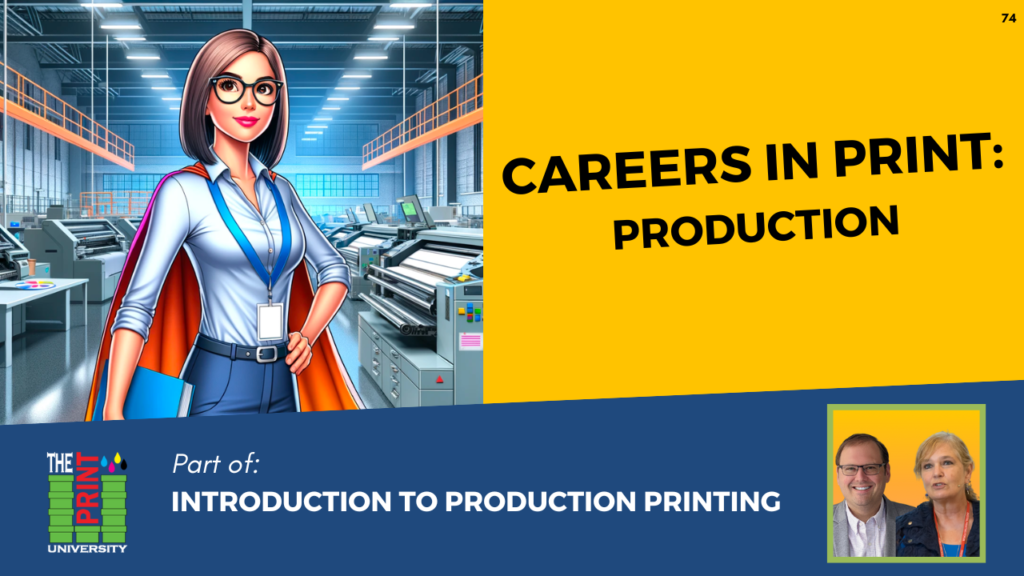Welcome to the world of print production, where every day brings new challenges and opportunities for creativity and innovation. In this blog post, we’ll explore the various roles within print production, the skills required for each position, and the importance of these roles in the overall success of a print shop. Whether you’re already working in the industry or considering a career in print, this guide will provide valuable insights into the dynamic and rewarding world of print production.
Understanding Print Production
Print production encompasses all the processes involved in bringing a printed piece from the concept stage to the final product. This includes everything from prepress operations, where files are prepared for printing, to the actual printing and finishing processes. The production team ensures that each print job is completed accurately, efficiently, and to the client’s specifications.
Key Roles in Print Production
1. Print Operations Manager
Role Overview:
Print operations managers are the conductors of the print shop, overseeing every aspect of the production process. They coordinate with prepress, printing, and finishing departments to ensure that jobs are completed on time and within budget.
Key Skills:
- Leadership: Inspiring and managing a diverse team.
- Organization: Keeping track of multiple jobs and resources.
- Problem-Solving: Addressing issues that arise during production.
Importance in Production:
Print operations managers are crucial for maintaining the smooth operation of the print shop. They ensure that resources are available, costs are controlled, and deadlines are met. Their leadership sets the tone for the entire production team, fostering a collaborative and efficient work environment.
2. Prepress Operator
Role Overview:
Prepress operators are the tech-savvy wizards who prepare digital files for printing. They check files for errors, adjust color settings, and ensure that the layout is optimized for the chosen printing method.
Key Skills:
- Technical Proficiency: Mastery of design software and color management tools.
- Attention to Detail: Ensuring that files are error-free and print-ready.
- Problem-Solving: Fixing issues with files before they reach the press.
Importance in Production:
Prepress operators are essential for ensuring that print jobs meet quality standards. Their work reduces the risk of errors during printing, saving time and materials. They bridge the gap between the client’s vision and the final printed product, ensuring that the end result matches expectations.
3. Printing Equipment Operator
Role Overview:
Printing equipment operators manage the machines that bring digital designs to life. They set up, operate, and maintain printing presses, ensuring that each job is produced to the highest quality standards.
Key Skills:
- Mechanical Aptitude: Understanding and maintaining complex machinery.
- Quality Control: Monitoring print quality and making adjustments as needed.
- Efficiency: Managing multiple machines and tasks simultaneously.
Importance in Production:
Printing equipment operators play a vital role in the production process. Their expertise ensures that each print job is executed flawlessly, from color accuracy to material handling. They are the first line of defense against print defects and are responsible for maintaining the integrity of the final product.
4. Finishing Equipment Operator
Role Overview:
Finishing equipment operators handle the final steps of the production process, including cutting, folding, binding, and packaging printed materials. They ensure that each piece meets the client’s specifications and is ready for distribution.
Key Skills:
- Precision: Ensuring that finishing processes are accurate and consistent.
- Mechanical Skills: Operating and maintaining finishing equipment.
- Quality Assurance: Inspecting finished products for defects.
Importance in Production:
Finishing equipment operators are critical for delivering polished, professional products. Their work transforms printed sheets into usable items, such as brochures, books, and packaging. They ensure that the final product is of the highest quality and ready for the market.
5. Warehouse Operator/Shipping Technician
Role Overview:
Warehouse operators, also known as shipping technicians, manage the logistics of storing and shipping printed materials. They track inventory, prepare orders for shipment, and coordinate with shipping carriers.
Key Skills:
- Organization: Keeping track of inventory and order status.
- Logistics: Coordinating shipping schedules and optimizing costs.
- Technology Proficiency: Using inventory management and shipping software.
Importance in Production:
Warehouse operators ensure that printed materials are stored safely and shipped efficiently. They play a key role in maintaining client satisfaction by ensuring that orders are delivered on time and in perfect condition. Their work supports the entire production process by managing the flow of materials in and out of the print shop.
The Superpowers of Print Production Roles
Each role within print production comes with its own set of “superpowers” that contribute to the success of the print shop:
- Print Operations Managers: Leadership, organization, and problem-solving.
- Prepress Operators: Technical proficiency, attention to detail, and problem-solving.
- Printing Equipment Operators: Mechanical aptitude, quality control, and efficiency.
- Finishing Equipment Operators: Precision, mechanical skills, and quality assurance.
- Warehouse Operators: Organization, logistics, and technology proficiency.
The Challenges and Rewards of Print Production Roles
Working in print production is not without its challenges. The fast-paced nature of the industry means that deadlines are tight, and accuracy is paramount. However, the rewards are significant. Print production professionals play a vital role in bringing creative visions to life, ensuring that clients receive high-quality products that meet their needs.
Print Professionals of Print Shops
Without the diligent work of operations managers, prepress operators, printing equipment operators, finishing equipment operators, and warehouse operators, the production process would come to a halt. These roles ensure that print jobs are accurately planned, produced, and delivered, enabling the print shop to provide outstanding results to clients.
As the print industry continues to evolve, the importance of skilled print production professionals cannot be overstated. Whether you are considering a career in print or looking to expand your knowledge of the industry, understanding the critical roles in print production is essential. These unsung heroes of the print shop are the ones who make it all possible, ensuring that every project runs smoothly from start to finish.



